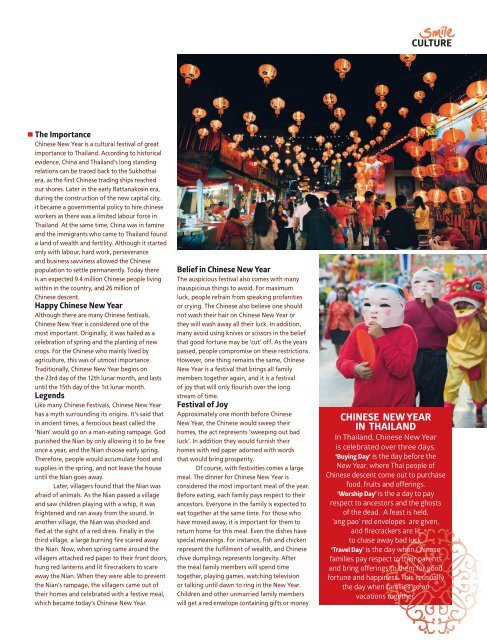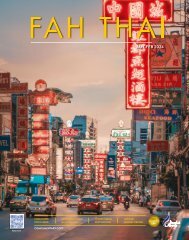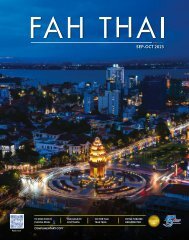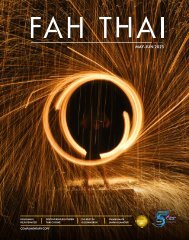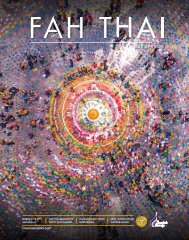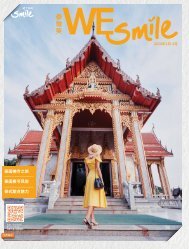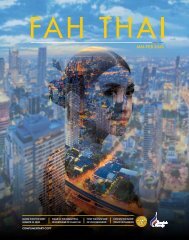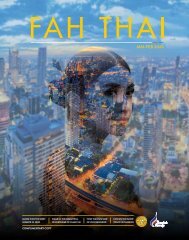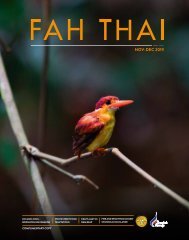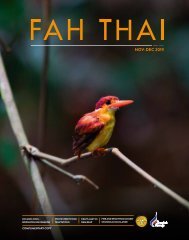WE Smile Magazine February 2016
The In-Flight Magazine of Thai Smile Airways
The In-Flight Magazine of Thai Smile Airways
You also want an ePaper? Increase the reach of your titles
YUMPU automatically turns print PDFs into web optimized ePapers that Google loves.
CULTURE<br />
The Importance<br />
Chinese New Year is a cultural festival of great<br />
importance to Thailand. According to historical<br />
evidence, China and Thailand’s long standing<br />
relations can be traced back to the Sukhothai<br />
era, as the first Chinese trading ships reached<br />
our shores. Later in the early Rattanakosin era,<br />
during the construction of the new capital city,<br />
it became a governmental policy to hire chinese<br />
workers as there was a limited labour force in<br />
Thailand. At the same time, China was in famine<br />
and the immigrants who came to Thailand found<br />
a land of wealth and fertility. Although it started<br />
only with labour, hard work, perseverance<br />
and business savviness allowed the Chinese<br />
population to settle permanently. Today there<br />
is an expected 9.4 million Chinese people living<br />
within in the country, and 26 million of<br />
Chinese descent.<br />
Happy Chinese New Year<br />
Although there are many Chinese festivals,<br />
Chinese New Year is considered one of the<br />
most important. Originally, it was hailed as a<br />
celebration of spring and the planting of new<br />
crops. For the Chinese who mainly lived by<br />
agriculture, this was of utmost importance.<br />
Traditionally, Chinese New Year begins on<br />
the 23rd day of the 12th lunar month, and lasts<br />
until the 15th day of the 1st lunar month.<br />
Legends<br />
Like many Chinese Festivals, Chinese New Year<br />
has a myth surrounding its origins. It’s said that<br />
in ancient times, a ferocious beast called the<br />
‘Nian’ would go on a man-eating rampage. God<br />
punished the Nian by only allowing it to be free<br />
once a year, and the Nian choose early spring.<br />
Therefore, people would accumulate food and<br />
supplies in the spring, and not leave the house<br />
until the Nian goes away.<br />
Later, villagers found that the Nian was<br />
afraid of animals. As the Nian passed a village<br />
and saw children playing with a whip, it was<br />
frightened and ran away from the sound. In<br />
another village, the Nian was shocked and<br />
fled at the sight of a red dress. Finally in the<br />
third village, a large burning fire scared away<br />
the Nian. Now, when spring came around the<br />
villagers attached red paper to their front doors,<br />
hung red lanterns and lit firecrackers to scare<br />
away the Nian. When they were able to prevent<br />
the Nian’s rampage, the villagers came out of<br />
their homes and celebrated with a festive meal,<br />
which became today’s Chinese New Year.<br />
Belief in Chinese New Year<br />
The auspicious festival also comes with many<br />
inauspicious things to avoid. For maximum<br />
luck, people refrain from speaking profanities<br />
or crying. The Chinese also believe one should<br />
not wash their hair on Chinese New Year or<br />
they will wash away all their luck. In addition,<br />
many avoid using knives or scissors in the belief<br />
that good fortune may be ‘cut’ off. As the years<br />
passed, people compromise on these restrictions.<br />
However, one thing remains the same, Chinese<br />
New Year is a festival that brings all family<br />
members together again, and it is a festival<br />
of joy that will only flourish over the long<br />
stream of time.<br />
Festival of Joy<br />
Approximately one month before Chinese<br />
New Year, the Chinese would sweep their<br />
homes, the act represents ‘sweeping out bad<br />
luck’. In addition they would furnish their<br />
homes with red paper adorned with words<br />
that would bring prosperity.<br />
Of course, with festivities comes a large<br />
meal. The dinner for Chinese New Year is<br />
considered the most important meal of the year.<br />
Before eating, each family pays respect to their<br />
ancestors. Everyone in the family is expected to<br />
eat together at the same time. For those who<br />
have moved away, it is important for them to<br />
return home for this meal. Even the dishes have<br />
special meanings. For instance, fish and chicken<br />
represent the fulfilment of wealth, and Chinese<br />
chive dumplings represents longevity. After<br />
the meal family members will spend time<br />
together, playing games, watching television<br />
or talking until dawn to ring in the New Year.<br />
Children and other unmarried family members<br />
will get a red envelope containing gifts or money.<br />
CHINESE NEW YEAR<br />
IN THAILAND<br />
In Thailand, Chinese New Year<br />
is celebrated over three days.<br />
‘Buying Day’ is the day before the<br />
New Year, where Thai people of<br />
Chinese descent come out to purchase<br />
food, fruits and offerings.<br />
‘Worship Day’ is the a day to pay<br />
respect to ancestors and the ghosts<br />
of the dead. A feast is held,<br />
‘ang pao’ red envelopes are given,<br />
and firecrackers are lit<br />
to chase away bad luck.<br />
‘Travel Day’ is the day when Chinese<br />
families pay respect to their parents<br />
and bring offerings to them for good<br />
fortune and happiness. This is usually<br />
the day when families go on<br />
vacations together.


